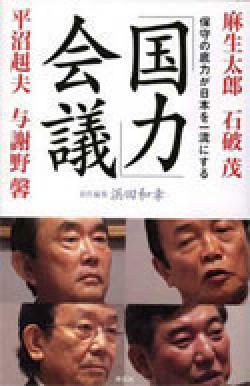Kokuryoku Kaigi

Shodensha, May 2008, 240 pages. Hardback ¥1600. ISBN-13: 978-4396613075
Reviews by Fumiko Halloran
This book, along with the other five individual books in this review, reflects a recent trend in which Japanese political leaders have expressed their visions and policy proposals on Internet homepages and television talk shows and by authoring books. Traditional political games are still played behind the scenes but in this age of instant communication, savvy politicians have sought to appeal directly to their constituents, potential voters, and citizens at large.
In this review group, they range in age from the youngest, Ishiba, 51, to Yosano, 70, in schooling from Tokyo University, Keio, Gakushuin, and Cairo University in Egypt, in professional background from business and banking to television. They also differ in in religion from Yosano and Aso who are Catholic, to Ishiba a Protestant, while Hiranuma and Koike do not state their religious background, and in avocation from Ishiba who collects miniature jet fighters and tanks, to Yosano who holds a seventh degree in Igo, a chess-like game, to Aso who was an Olympic skeet shooter in the Montreal games.
In Kokuryoku Kaigi, as well as in their own individual books, each emphasizes their belief that Japan could contribute much to the peace and prosperity of the international community but they differ on domestic issues such as taxes and privatizing postal service and health care. Some assert that Japan need not kowtow to the United States on every issue while others discuss pending issues with the US. The Japanese inferiority complex that dominated relations with westerners after World War II seems to be gone. Although they vary from pessimistic to optimistic on the present status of Japan, they all believe Japan can survive and contend they are ready to lead.
In foreign policy all assert that close relations with the United States are vital to Japan’s security. Even so, they have much to say about the nature of those relations and are sometimes critical of the way American officials deal with issues.
These politicians do not consider their conservatism to be right wing or nationalistic. Rather, they assert that true conservatism is to preserve good traditions inherent in Japanese culture but at the same time they recognize the need for change. They are clearly opposed to communism and socialism and committed to democracy; at the same time they support the imperial institution, and embrace a free market economy. On health care, pensions, elderly care, and protection of the poor, they believe the government should extend assistance and differ only on specific measures.

